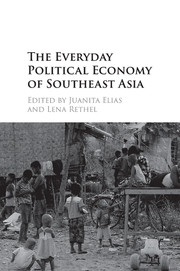Book contents
- Frontmatter
- Epigraph
- Contents
- List of Figures and Map
- List of Tables
- Notes on Contributors
- Acknowledgements
- Part I Introduction
- 1 Southeast Asia and Everyday Political Economy
- Part II From Development to Multiple Modernities
- Part III Widening and Deepening Markets
- Part IV People, Mobilities and Work
- Part V Conclusion
- Index
- References
1 - Southeast Asia and Everyday Political Economy
from Part I - Introduction
Published online by Cambridge University Press: 05 August 2016
- Frontmatter
- Epigraph
- Contents
- List of Figures and Map
- List of Tables
- Notes on Contributors
- Acknowledgements
- Part I Introduction
- 1 Southeast Asia and Everyday Political Economy
- Part II From Development to Multiple Modernities
- Part III Widening and Deepening Markets
- Part IV People, Mobilities and Work
- Part V Conclusion
- Index
- References
Summary
Introduction
Southeast Asia is an increasingly interdependent, globalized and urbanized region of the world. The eleven countries that are generally understood as comprising modern-day Southeast Asia are now ever more closely linked together via flows of trade, investment and migration, in addition to traditional state-led processes of regional integration – most notably the emergence of the Association of Southeast Asian Nations (ASEAN) – as well as ever closer, and overlapping, bilateral economic and security ties. In the nearly two decades since Thailand floated the baht, an event commonly held to mark the outbreak of the Asian financial crisis of 1997–8, the region has become more closely integrated than ever before. The launch of the ASEAN Economic Community marks – at least rhetorically – the high point of a period of state-led economic development, market reform and regional integration. Indeed today, we see a region that while not unified is certainly deeply interconnected. In the shadow of Asia's two giants, India and China, the Southeast Asian region has been somewhat sidelined within debates about and discussions of the looming ‘Asian Century’.
Much analytical effort has been put into understanding the respective influences of state and market forces in driving the region's economic transformation. Nonetheless, Southeast Asia provides an important site for considering how processes of economic transformation are refashioning – and refashioned by – the lives and daily routines of ordinary people: their decisions to migrate across borders; their experiences of growing affluence as well as of inequality, poverty and associated forms of violence and destitution; their activities as activists, citizens and workers; and the ways in which economic and social relations, responsibilities and activities are being transformed. Southeast Asia is, and will remain, a heterogeneous region of the world. And yet, this very diversity of culture, politics, religion, society and economics – intersecting with divisions of race, class, gender and even age – provides important insights into how economic transformation takes shape. If we are entering an Asian Century, then we need to remain attentive to how this transformation is taking shape in the lives of Asia's people and their engagement in changing economic practices, with Southeast Asia providing an important terrain for initiating this focus.
- Type
- Chapter
- Information
- The Everyday Political Economy of Southeast Asia , pp. 3 - 24Publisher: Cambridge University PressPrint publication year: 2016
References
- 4
- Cited by



